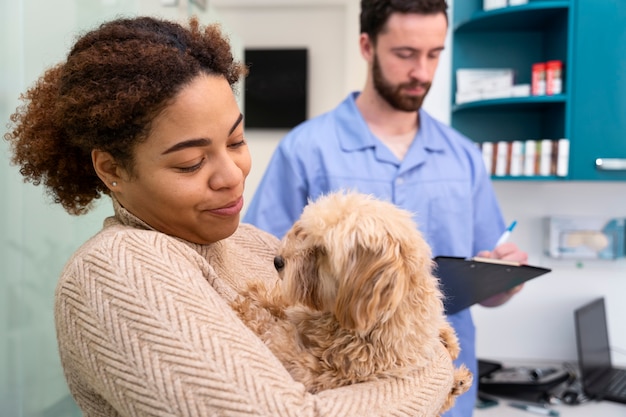Recognizing Signs of Dental Disease in Dogs and Cats


Recognizing Signs of Dental Disease in Dogs and Cats
Keeping your pet healthy involves more than just regular feeding, exercise, and affection. One of the most overlooked aspects of pet health is oral care, yet dental disease is one of the most common medical issues affecting both dogs and cats. At Rapides Animal Medical Center, located at 5990 Jackson Street, Alexandria, LA 71303, our veterinary team is dedicated to helping pet owners recognize both subtle and obvious signs of dental disease in pets. Understanding these indicators can make a significant difference in your pet’s comfort, wellness, and long-term quality of life.
In this blog, we will guide you through the warning signs of dental disease in dogs and cats, explain the causes and risks associated with untreated oral health issues, outline professional treatment options, and share simple steps you can take at home to support cat and dog oral health. If you are searching for a dental vet near me or want to learn more about pet dental cleanings in Alexandria, you are in the right place. Our commitment to comprehensive veterinary services includes thorough oral evaluations and advanced dental treatments, all delivered with the compassionate, client-focused care our community relies on.
Whether you are in Alexandria or one of the surrounding communities, our team is ready to support your pet’s oral health needs. If you are concerned about your pet’s teeth or gums, it may be time to schedule an appointment for a dental checkup or cleaning. You can also explore our professional dental cleaning services for dogs and cats for more information about how regular care can prevent dental disease.
Understanding the Signs of Dental Disease in Pets
Dental disease in pets often develops quietly, with early symptoms easily missed or mistaken for minor issues. Recognizing these signs early is important for maintaining your pet’s overall well-being and preventing more serious health problems down the line.
Subtle and Early Signs
In many cases, the first symptoms of dental disease in pets are mild and may go unnoticed unless you are actively monitoring your pet’s mouth. Early indicators include a slight change in breath odor, which may progress from neutral to noticeably unpleasant. You might also notice your pet chewing more slowly or favoring one side of the mouth while eating. Additionally, some pets may show a decreased interest in hard treats or dry kibble, preferring softer foods instead.
Other subtle signs include mild drooling, pawing at the mouth, or licking their lips more frequently than usual. Cats, in particular, may become more withdrawn or irritable if their mouths are uncomfortable, while dogs might shy away from chew toys or bones they previously enjoyed.
Obvious and Advanced Signs
As dental disease progresses, symptoms become more pronounced and often cause significant discomfort. Key warning signs to watch for are persistent bad breath, visible tartar or discoloration on teeth, red or bleeding gums, and swelling around the mouth or jaw. Pets with advanced dental disease may have loose or missing teeth, visible sores or lumps in the mouth, or pus along the gumline.
In some cases, pets will drop food while eating, cry out in pain, or even refuse to eat altogether. Behavioral changes such as increased aggression, lethargy, or reluctance to be touched around the face can also indicate oral pain. If you notice any of these signs, it is important to schedule a dental evaluation with your veterinarian as soon as possible.
Professional veterinary services near me, including dental exams and cleanings, are essential for diagnosing and treating these problems before they lead to more significant health issues.
What Causes Dental Disease in Dogs and Cats?
Understanding how dental disease develops can help you take proactive steps to protect your pet’s oral health. The most common cause is the buildup of plaque and tartar on the teeth. Plaque is a sticky film made up of bacteria and food particles that adheres to the tooth surface. If not removed through regular brushing or professional cleanings, plaque hardens into tartar, which can only be removed by a veterinarian.
Tartar and plaque irritate the gums, leading to gingivitis, which is the first stage of periodontal disease. Left untreated, gingivitis can progress to periodontitis, where the tissues and bone supporting the teeth become damaged. This process is often painful and can eventually cause tooth loss.
Genetics play a role in dental disease, with some breeds being more prone to oral health issues than others. Small dogs and certain cat breeds tend to accumulate plaque and tartar more quickly. Diet also influences dental health; pets that eat mainly soft foods without the abrasive action of dry kibble or dental treats may be at a higher risk.
In addition to these factors, age is another major contributor, as dental disease becomes more common in older pets. Underlying health problems like diabetes or immune disorders can also worsen oral health, making regular checkups and cat and dog oral health assessments even more important for at-risk pets in Alexandria and surrounding communities.
Professional Treatment Options for Dental Disease
When dental disease is suspected or diagnosed, timely veterinary intervention is critical for restoring your pet’s comfort and health. Treatment approaches involve several key steps, depending on the severity of the condition and your pet’s individual needs.
Comprehensive Dental Exams and Cleanings
The foundation of professional dental treatment is a thorough oral examination, often performed under anesthesia for safety and accuracy. During this process, our veterinarians will assess the teeth, gums, and oral tissues, look for hidden pockets of infection, and evaluate the overall health of your pet’s mouth. Dental x-rays may be taken to check for problems below the gumline that are not visible during a standard exam.
A professional dental cleaning is performed to remove all plaque and tartar from the teeth, both above and below the gumline. This meticulous cleaning is essential for halting the progression of dental disease and preventing further complications. If you are interested in learning more about the benefits of regular dental cleanings, visit our professional dental cleaning services for dogs and cats page.
Dental Fillings, Extractions, and Oral Surgery
For pets with cavities, damaged teeth, or advanced periodontal disease, additional treatments may be necessary. Dental fillings for pets can be used to restore teeth affected by cavities or minor structural issues. When a tooth is severely damaged, loose, or infected, extraction may be required to prevent ongoing pain and infection. In complex cases, oral surgery may be recommended to address deep infections, oral tumors, or other serious conditions. Our veterinary team provides a range of advanced dental services, including pet tooth extractions and pet oral surgery, to ensure your pet receives the highest standard of care.
Throughout every step, your pet’s comfort and safety are our top priorities. We use modern anesthesia protocols, advanced monitoring equipment, and gentle handling techniques to minimize stress and support a smooth recovery.
Preventing Dental Disease: Home Care and Veterinary Support
While professional veterinary care is essential for addressing dental disease, there are many steps pet owners can take at home to support cat and dog oral health. Preventive care is the best way to protect your pet’s teeth and gums between professional cleanings.
Daily and Weekly Home Care Tips
One of the most effective strategies is regular tooth brushing with a pet-safe toothpaste. Start slowly by introducing your pet to the toothbrush and paste, gradually working up to brushing all surfaces of the teeth each day. Even if daily brushing is not possible, doing so several times a week can make a significant difference.
Dental treats and chews designed to reduce plaque can be a helpful supplement, although they should not replace brushing or professional cleanings. Some pets enjoy dental diets formulated to help clean teeth as they eat. Always choose products that are approved by veterinary dental organizations for safety and effectiveness.
Monitor your pet’s mouth weekly for changes in breath odor, gum color, or the appearance of the teeth. Early detection of problems allows for prompt intervention and reduces the risk of complications.
The Role of Professional Preventive Care
Routine veterinary checkups are vital for catching dental issues before they become severe. During your pet’s wellness exams, our veterinarians will assess the mouth and recommend appropriate preventive services based on your pet’s needs and risk factors. For pet owners in Alexandria, scheduling regular dental evaluations and cleanings at Rapides Animal Medical Center helps ensure your pet receives comprehensive oral care tailored to their individual health profile.
When to Seek Veterinary Care for Dental Concerns
Deciding when to seek professional help can be challenging, especially when symptoms are mild or intermittent. As a general rule, any persistent changes in eating habits, breath odor, or mouth appearance should be evaluated by a veterinarian. If your pet is experiencing pain, bleeding, drooling, or visible oral damage, immediate attention is needed.
For pet dental cleanings near me or emergency dental care in Alexandria, it is important to contact a veterinary team with experience in diagnosing and treating dental disease in pets. The risks of delaying treatment include ongoing pain, tooth loss, and the potential spread of infection to other parts of the body, such as the heart, liver, or kidneys.
If you are ever uncertain about your pet’s oral health, do not hesitate to reach out for guidance. Our veterinarians are here to answer your questions and provide the support you need to keep your pet healthy and comfortable.
Protect Your Pet’s Smile with Rapides Animal Medical Center
Dental disease can have a profound impact on your pet’s comfort, behavior, and overall health. By recognizing early signs of dental disease in pets and seeking timely treatment, you can help your companion enjoy a happier, healthier life. At Rapides Animal Medical Center, our veterinary professionals are committed to providing the highest standard of cat and dog oral health services in Alexandria and surrounding communities.
If you have noticed any warning signs or simply want to ensure your pet’s mouth is as healthy as possible, we invite you to schedule an appointment with our experienced veterinary team. For more information about professional dental treatments, explore our pages on pet tooth extractions or pet oral surgery.
Your pet’s dental health matters. Reach out to the best vet near me by calling Rapides Animal Medical Center at (318) 445-5245 or visiting us at 5990 Jackson Street, Alexandria, LA 71303. Together, we will protect your pet’s smile with quality veterinary services in Alexandria—because every pet deserves expert, compassionate care.
This blog provides general information and is not a substitute for professional veterinary advice. If you have concerns about your pet’s health, please consult your veterinarian.


















